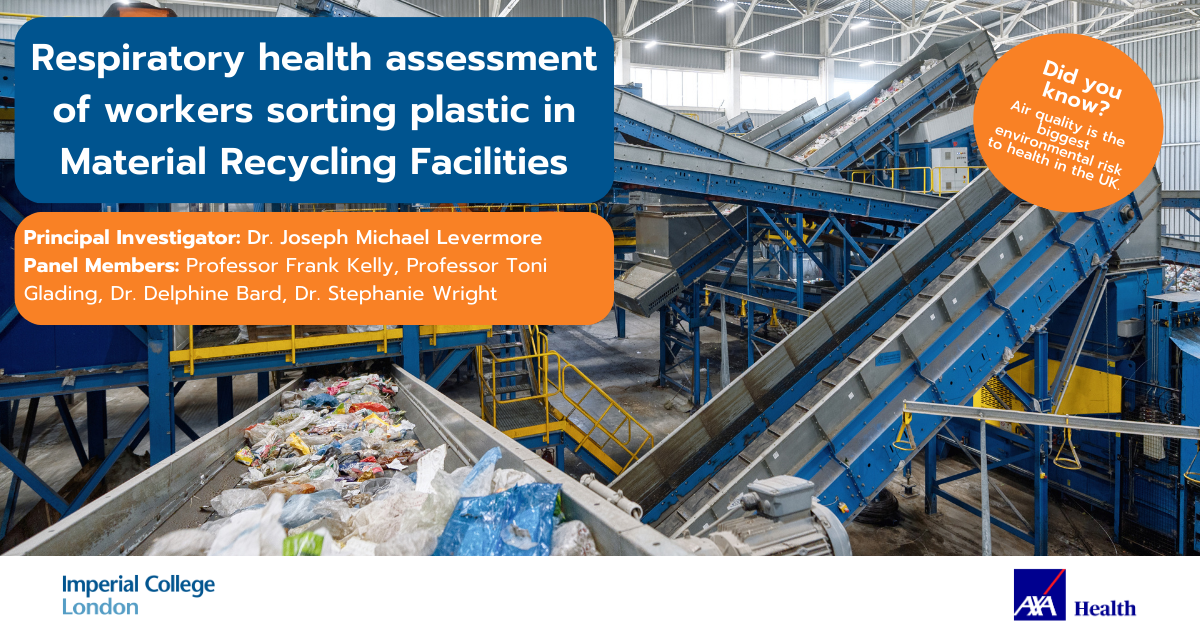
Dr. Joseph Levermore, AXA Fellow at the Imperial College London, intends to conduct a pilot study in pMRFs across the United Kingdom. He will investigate the health impact of occupational exposure to airborne dust resulting from different activities along the recycling chain. He will analyse collected air and human biological samples (blood, urine, and faecal matter) using microscopy and mass spectrometry instrumentation to identify markers for inflammation associated with acute health impacts from airborne dust inhalation.
This study will work with Material Recycling Facility operators to co-create a study that provides industry leaders with a tailored roadmap to implement responsible policies that safeguard your workforce while protecting productivity. In addition to this, engaged sites will receive:
- A robust dataset going beyond standard testing to explore cutting-edge insights on dust and health
- Free access to detailed site-specific findings to inform future safety programs
- Guidance from experts and industry personnel on best practices to reduce worker exposures
Engaged sites can be assured all involvement is confidential, and non-disclosure agreements will be arranged to protect the identification of sites - whilst permitting the scientific publication of findings.
This study will attempt to build a vibrant and healthy workplace for all employees across Material Recycling Facilities.
The initial study design consists of two key elements: air quality and health assessment.
Air quality assessment
Co-located ambient Particulate matter <4 µm (PM4) and PM2.5 measurements will be obtained at a daily resolution from three locations across the MRF using Partisol 2025i. In addition, 15 participants will be invited to collect PM4 personal exposure measurements, where they wear an air quality monitor for one day’s work. Collected samples will be analysed using high-resolution instrumentation to understand the chemical composition of airborne dust.
Health assessment
All employees at engaged sites will receive invitations to fill out a health questionnaire and undergo lung function assessments (Part One). Out of this group, 15 individuals will be selected to provide pre-and post-shift blood samples while wearing air quality monitors (Part Two). As a thank you for participating in the study, employees will receive a £5 voucher for Pret. If an employee choose to take part in Part two will receive £100. Part two individuals should note that this payment can be seen as taxable income.
Analysis
We will assess samples to confirm their adherence to occupational airborne dust standards. We will analyse air samples for chemicals using a multi-modal approach, enabling us to profile sites based on their chemical composition. Using epidemiological statistics will investigate how such airborne dust inhalation relates to impacts found in the health assessment and more acute blood analysis. With blood samples being interrogated for the presence of inflammatory markers. This is hoped to help employees "visualise the invisible" pollutants in their workplace and could be used as a resource to emphasise the need for behavioural change, such as more stringent use of personal protective equipment.
Interested in being involved?
Interested in expressing interest as a site - please fill out the questionnaire below:
Social media
Keep up to date by following us on our social channels
Twitter: ERGImperial | YouTube: Environmental Research Group


